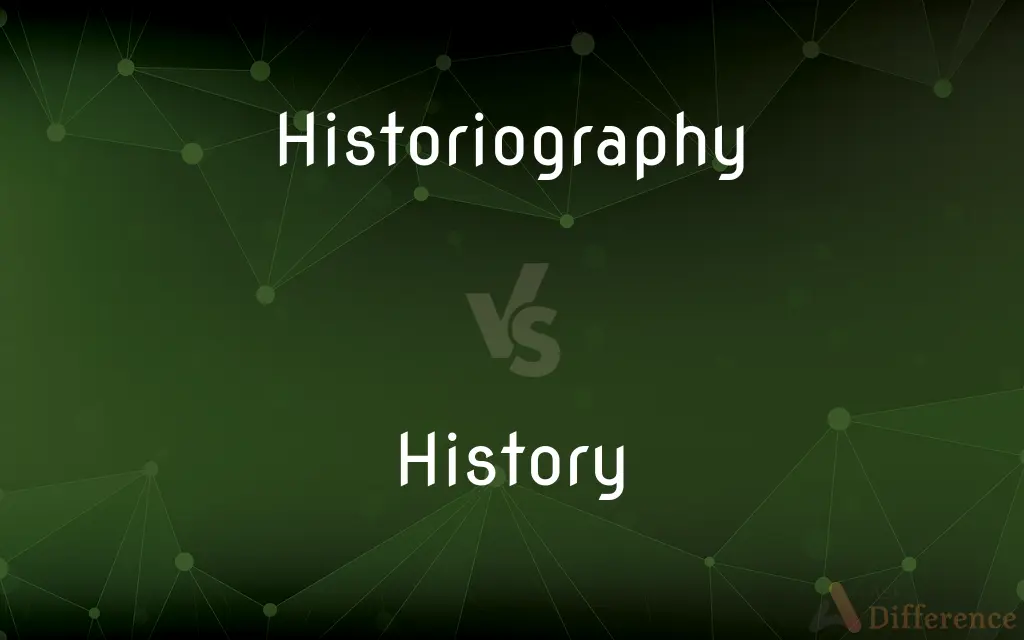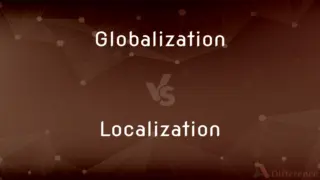Historiography vs. History — What's the Difference?
By Tayyaba Rehman & Urooj Arif — Updated on March 7, 2024
Historiography focuses on the methods and approaches to studying and writing history, while history is the study of past events.

Difference Between Historiography and History
Table of Contents
ADVERTISEMENT
Key Differences
Historiography is the study of how history is written, including the methodologies, sources, and interpretations used by historians. It examines the various perspectives and biases that influence the recording and understanding of historical events. On the other hand, history is concerned with the actual events, experiences, and realities of the past. It seeks to reconstruct and understand what happened in bygone eras based on available evidence and documentation.
While historiography critically analyzes the narrative and construction of history, including the historian's role, perspectives, and theoretical frameworks, history itself is focused on uncovering, documenting, and understanding past events as they occurred. Historiography asks questions about the nature of historical knowledge and the ways in which we come to understand the past, whereas history is the pursuit of uncovering that past through research and evidence.
Historiography also explores the evolution of historical thought and how interpretations of events have changed over time. This involves studying different schools of historical thought and how they have influenced the portrayal and understanding of history. Meanwhile, the study of history involves delving into specific periods, regions, and themes to uncover what happened and why.
In historiography, there is a significant emphasis on the critical evaluation of historical sources and the methodology employed in historical research. It scrutinizes the reliability, bias, and context of sources used to construct historical narratives. In contrast, history utilizes these sources to build narratives and analyses of past events, often employing the methodologies critiqued by historiography.
Finally, historiography can be seen as a meta-analysis of history, reflecting on the discipline itself, its challenges, and its evolution. History, however, is the foundational discipline that provides the raw material for historiographical study, focusing on the concrete details and narratives of the past.
ADVERTISEMENT
Comparison Chart
Focus
Methods and approaches to studying and writing history
Study of past events
Key Questions
How is history written and understood?
What happened in the past?
Emphasis
Critical evaluation of sources and methodologies
Reconstruction of past events
Relationship
Reflects on the discipline of history
Provides the material for historiographical study
Evolution
Studies changes in historical thought and interpretation
Focuses on changes in actual historical events
Compare with Definitions
Historiography
Study of Historical Writing.
Historiography examines how the Civil War has been depicted in various history books over time.
History
Record of Past Events.
The history of Ancient Rome is filled with tales of conquest and innovation.
Historiography
Analysis of Methodologies.
Her research in historiography focused on the use of oral histories in documenting indigenous cultures.
History
Study of Bygone Eras.
Her fascination with history led her to a career in archaeology.
Historiography
Critical Evaluation of Sources.
In historiography, questioning the bias of primary sources is essential for understanding historical narratives.
History
Chronological Narratives.
The book provided a detailed history of the French Revolution, from its causes to its aftermath.
Historiography
History of Historical Thought.
His lecture on historiography traced the evolution from the Great Man theory to social history perspectives.
History
Documentation of Human Experience.
Oral histories contribute to our understanding of history by preserving personal experiences.
Historiography
Meta-Analysis of History.
The conference on historiography discussed the impact of digital archives on historical research.
History
Analysis of Historical Events.
The documentary offered an in-depth history of the civil rights movement in America.
Historiography
Historiography is the study of the methods of historians in developing history as an academic discipline, and by extension is any body of historical work on a particular subject. The historiography of a specific topic covers how historians have studied that topic using particular sources, techniques, and theoretical approaches.
History
History (from Greek ἱστορία, historia, meaning "inquiry; knowledge acquired by investigation") is the study of the past. Events before the invention of writing systems are considered prehistory.
Historiography
The principles, theories, or methodology of scholarly historical research and presentation.
History
A chronological record of events, as of the life or development of a people or institution, often including an explanation of or commentary on those events
A history of the Vikings.
Historiography
The writing of history based on a critical analysis, evaluation, and selection of authentic source materials and composition of these materials into a narrative subject to scholarly methods of criticism.
History
A formal written account of related natural phenomena
A history of volcanoes.
Historiography
A body of historical literature.
History
A record of a patient's general medical background
Took the patient's history.
Historiography
The writing of history; a written history.
History
An established condition or pattern of behavior
An inmate with a history of mental illness and drug abuse.
Historiography
(uncountable) The study of the discipline and practice of history and the writings of past historians.
History
The branch of knowledge that records and analyzes past events
"History has a long-range perspective" (Elizabeth Gurley Flynn).
Historiography
The art of employment of an historiographer.
History
The past events relating to a particular thing
The history of their rivalry is full of intrigue.
History
The aggregate of past events or human affairs
Basic tools used throughout history.
History
An interesting past
A house with history.
History
Something that belongs to the past
Their troubles are history now.
History
(Slang) One that is no longer worth consideration
Why should we worry about him? He's history!.
History
A drama based on historical events
The histories of Shakespeare.
History
The aggregate of past events.
History repeats itself if we don’t learn from its mistakes.
History
The branch of knowledge that studies the past; the assessment of notable events.
He teaches history at the university.
History will not look kindly on these tyrants.
He dreams of an invention that will make history.
History
The portion of the past that is known and recorded by this field of study, as opposed to all earlier and unknown times that preceded it (prehistory).
In all of human history and prehistory
In all recorded history
History
(countable) A set of events involving an entity.
What is your medical history?
The family's history includes events best forgotten.
A long and sordid history
History
(countable) A record or narrative description of past events.
I really enjoyed Shakespeare's tragedies more than his histories.
A short history of post-Columbian colonization
History
A list of past and continuing medical conditions of an individual or family.
A personal medical history is required for the insurance policy.
He has a history of cancer in his family.
This diagnosis is usually based solely on the history and physical examination, although laboratory tests are occasionally also obtained.
History
A record of previous user events, especially of visited web pages in a browser.
I visited a great site yesterday but forgot the URL. Luckily, I didn't clear my history.
History
(informal) Something that no longer exists or is no longer relevant.
I told him that if he doesn't get his act together, he's history.
History
(uncountable) Shared experience or interaction.
There is too much history between them for them to split up now.
He has had a lot of history with the police.
History
(obsolete) To narrate or record.
History
A learning or knowing by inquiry; the knowledge of facts and events, so obtained; hence, a formal statement of such information; a narrative; a description; a written record; as, the history of a patient's case; the history of a legislative bill.
History
A systematic, written account of events, particularly of those affecting a nation, institution, science, or art, and usually connected with a philosophical explanation of their causes; a true story, as distinguished from a romance; - distinguished also from annals, which relate simply the facts and events of each year, in strict chronological order; from biography, which is the record of an individual's life; and from memoir, which is history composed from personal experience, observation, and memory.
Histories are as perfect as the historian is wise, and is gifted with an eye and a soul.
For aught that I could ever read,Could ever hear by tale or history.
What histories of toil could I declare!
Justly Cæsar scorns the poet's lays;It is to history he trusts for praise.
No more yet of this;For 't is a chronicle of day by day,Not a relation for a breakfast.
Many glorious examples in the annals of our religion.
History
To narrate or record.
History
The aggregate of past events;
A critical time in the school's history
History
The continuum of events occurring in succession leading from the past to the present and even into the future;
All of human history
History
A record or narrative description of past events;
A history of France
He gave an inaccurate account of the plot to kill the president
The story of exposure to lead
History
The discipline that records and interprets past events involving human beings;
He teaches Medieval history
History takes the long view
History
All that is remembered of the past as preserved in writing; a body of knowledge;
The dawn of recorded history
From the beginning of history
Common Curiosities
Why is historiography important?
Historiography is important because it critically evaluates how history is recorded and interpreted, highlighting the influence of perspectives and biases.
What are primary sources in history?
Primary sources are direct or firsthand evidence of historical events, such as documents, artifacts, or eyewitness accounts.
How does historiography differ from history?
Historiography focuses on the methods and approaches to studying and writing history, while history is the study of past events themselves.
What is historiography?
Historiography is the study of how history is written, including the methodologies, biases, and interpretations used by historians.
What role do historians play in shaping history?
Historians play a crucial role in shaping history through their selection, interpretation, and presentation of historical evidence.
How do historians deal with conflicting sources?
Historians critically analyze conflicting sources, considering their context, reliability, and bias, to construct a balanced historical interpretation.
What is the significance of chronology in history?
Chronology is essential in history for understanding the sequence, timing, and context of events, which helps in constructing accurate historical narratives.
Can historiographical approaches vary by culture?
Yes, historiographical approaches can vary significantly by culture, reflecting different traditions, values, and perspectives on the past.
Can history be objective?
While historians strive for objectivity, complete objectivity is challenging due to the inherent biases in sources and the interpretation of events.
How do digital technologies impact historiography?
Digital technologies have transformed historiography by enabling broader access to sources, facilitating new analytical methods, and encouraging interdisciplinary approaches.
How can we ensure the reliability of historical research?
Ensuring reliability in historical research involves critical source evaluation, transparent methodology, and engaging with diverse perspectives and evidence.
How has historiography evolved over time?
Historiography has evolved to include diverse perspectives and methodologies, moving from a focus on great figures and events to incorporating social, cultural, and everyday life aspects.
What is the role of bias in historical interpretation?
Bias can shape historical interpretation by influencing which sources are considered, how they are read, and what narratives are constructed, making critical evaluation essential.
What is a historical narrative?
A historical narrative is a coherent story or account of past events constructed from historical evidence.
What is a revisionist history?
Revisionist history involves reinterpreting established historical narratives, often challenging traditional views with new evidence or perspectives.
Share Your Discovery

Previous Comparison
Globalization vs. Localization
Next Comparison
Chris vs. KrisAuthor Spotlight
Written by
Tayyaba RehmanTayyaba Rehman is a distinguished writer, currently serving as a primary contributor to askdifference.com. As a researcher in semantics and etymology, Tayyaba's passion for the complexity of languages and their distinctions has found a perfect home on the platform. Tayyaba delves into the intricacies of language, distinguishing between commonly confused words and phrases, thereby providing clarity for readers worldwide.
Co-written by
Urooj ArifUrooj is a skilled content writer at Ask Difference, known for her exceptional ability to simplify complex topics into engaging and informative content. With a passion for research and a flair for clear, concise writing, she consistently delivers articles that resonate with our diverse audience.















































